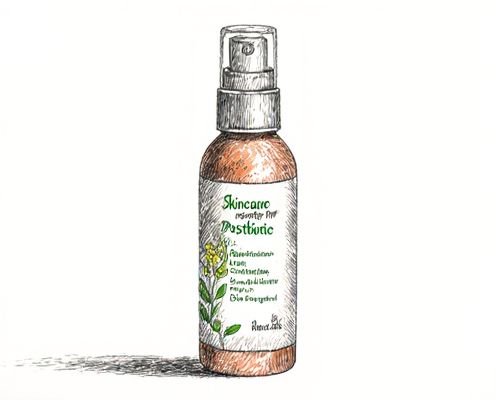
Postbiotic Illustration
Postbiotics enhance skincare by supporting the skin's natural microbiome, promoting a balanced and healthy complexion. These compounds, derived from probiotic fermentation, help strengthen the skin barrier and reduce inflammation. Incorporating postbiotic skincare products can improve hydration and soothe sensitive skin for a radiant, resilient appearance.
Introduction to Postbiotics in Women's Skincare
Postbiotics are bioactive compounds produced by probiotic bacteria during fermentation that enhance skin barrier function and hydration. In women's skincare, postbiotics help reduce inflammation, improve skin elasticity, and balance the microbiome, promoting healthier, radiant skin. Incorporating postbiotic-rich products supports natural defense mechanisms and accelerates skin repair processes.
What Are Postbiotics? Understanding the Basics
Postbiotics are bioactive compounds produced by probiotic bacteria during fermentation that provide health benefits to the skin by enhancing its natural barrier and reducing inflammation. These substances include enzymes, peptides, and organic acids that promote skin hydration, balance the microbiome, and improve overall skin resilience. Incorporating postbiotics in skincare supports skin repair and strengthens immune defense against environmental stressors.
How Postbiotics Differ from Probiotics and Prebiotics
Postbiotics are bioactive compounds produced by probiotic bacteria during fermentation, offering direct benefits to skin health unlike probiotics, which are live microorganisms, and prebiotics, which are non-digestible fibers that nourish these bacteria. Postbiotics include enzymes, peptides, and organic acids that enhance the skin barrier, reduce inflammation, and maintain microbiome balance without the need for live cultures. Their stable, non-viable nature allows for easier formulation into skincare products, providing targeted support for sensitive or compromised skin.
Key Benefits of Postbiotics for Women’s Skin
Postbiotics enhance women's skin by strengthening the skin barrier, reducing inflammation, and promoting hydration for a smoother, more radiant complexion. These bioactive compounds support the natural microbiome balance, helping to prevent acne and irritation commonly faced by sensitive or hormonally imbalanced skin. Their antioxidant properties also protect against environmental damage, aiding in anti-aging and overall skin health maintenance.
Mechanisms: How Postbiotics Support Skin Health
Postbiotics enhance skin health by reinforcing the skin barrier, promoting hydration, and modulating inflammation through the production of bioactive compounds such as short-chain fatty acids and antimicrobial peptides. These compounds help balance the skin microbiome, reducing the prevalence of harmful bacteria while supporting beneficial microbes. Incorporating postbiotic skincare products supports your skin's natural defense mechanisms, leading to improved resilience and overall skin vitality.
Postbiotics for Sensitive and Aging Skin Concerns
Postbiotics, bioactive compounds derived from probiotic bacteria, play a crucial role in enhancing sensitive and aging skin health by strengthening the skin barrier and reducing inflammation. These metabolites, including peptides and short-chain fatty acids, help restore microbiome balance, promoting hydration and reducing redness commonly seen in sensitive skin. Incorporating postbiotic skincare products supports skin rejuvenation and improves resilience against environmental stressors, making them ideal for mature and delicate skin types.
Scientific Evidence Behind Postbiotics in Skincare
Postbiotics, bioactive compounds produced by probiotic bacteria, have demonstrated significant benefits in skincare through scientific research, including enhancing the skin's barrier function and modulating inflammatory responses. Studies reveal that postbiotics increase the production of antimicrobial peptides, which help protect against pathogenic bacteria and promote healthy skin microbiota balance. Clinical trials confirm that formulations containing postbiotics improve skin hydration, reduce redness, and accelerate wound healing, highlighting their potential as effective ingredients in dermatological treatments.
How to Choose Postbiotic Skincare Products for Women
When choosing postbiotic skincare products for women, prioritize formulations that include well-researched postbiotic ingredients such as Lactobacillus fermented extracts or Bifidobacterium lysates known for their skin barrier repair and anti-inflammatory benefits. Select products with a balanced pH and minimal irritants to ensure compatibility with sensitive skin and promote optimal microbiome health. Look for clinical evidence or dermatologist endorsements to guarantee product efficacy and safety in maintaining skin hydration and reducing redness.
Tips for Incorporating Postbiotics into Your Skincare Routine
Incorporate postbiotics into your skincare routine by choosing products that list fermented ingredients or postbiotic extracts, which help strengthen your skin's natural barrier. Apply these products after cleansing and toning to enhance hydration and soothe inflammation effectively. Consistent use of postbiotics promotes balanced skin microbiota, reducing redness and boosting overall skin resilience.
Top Postbiotic Skincare Products Recommended for Women
Top postbiotic skincare products recommended for women include formulations enriched with Lactobacillus ferment lysate and Bifida ferment lysate, which enhance skin barrier function and hydration. Brands like TULA Skincare, Mother Dirt, and Krave Beauty offer potent postbiotic serums and moisturizers designed to balance the skin microbiome and reduce inflammation. Consistent use of these products supports improved skin texture, reduced redness, and long-lasting moisture retention.
 womendy.com
womendy.com